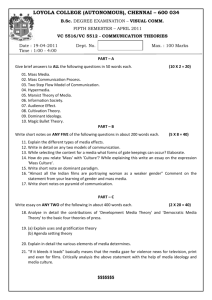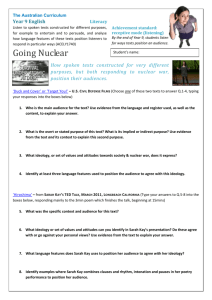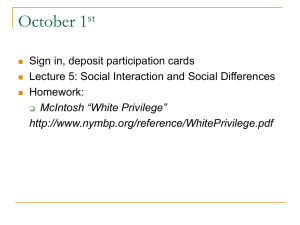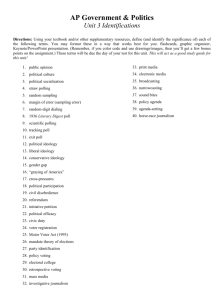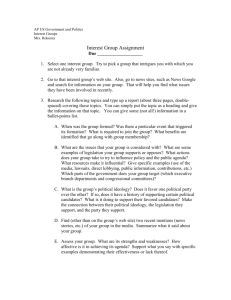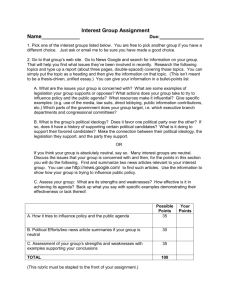Week 1: Lecture notes – What is Popular culture Slide 1 Culture
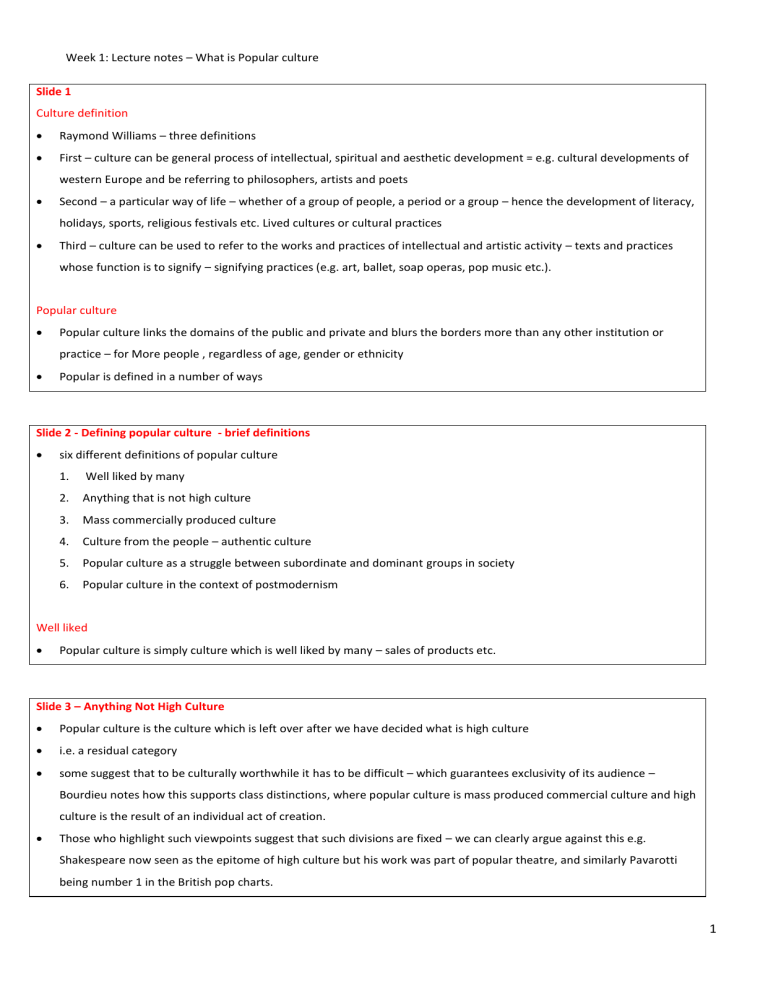
Week 1: Lecture notes – What is Popular culture
Slide 1
Culture definition
Raymond Williams – three definitions
First – culture can be general process of intellectual, spiritual and aesthetic development = e.g. cultural developments of western Europe and be referring to philosophers, artists and poets
Second – a particular way of life – whether of a group of people, a period or a group – hence the development of literacy, holidays, sports, religious festivals etc. Lived cultures or cultural practices
Third – culture can be used to refer to the works and practices of intellectual and artistic activity – texts and practices whose function is to signify – signifying practices (e.g. art, ballet, soap operas, pop music etc.).
Popular culture
Popular culture links the domains of the public and private and blurs the borders more than any other institution or practice – for More people , regardless of age, gender or ethnicity
Popular is defined in a number of ways
Slide 2 - Defining popular culture - brief definitions
six different definitions of popular culture
1.
Well liked by many
2.
Anything that is not high culture
3.
Mass commercially produced culture
4.
Culture from the people – authentic culture
5.
Popular culture as a struggle between subordinate and dominant groups in society
6.
Popular culture in the context of postmodernism
Well liked
Popular culture is simply culture which is well liked by many – sales of products etc.
Slide 3 – Anything Not High Culture
Popular culture is the culture which is left over after we have decided what is high culture
i.e. a residual category
some suggest that to be culturally worthwhile it has to be difficult – which guarantees exclusivity of its audience –
Bourdieu notes how this supports class distinctions, where popular culture is mass produced commercial culture and high culture is the result of an individual act of creation.
Those who highlight such viewpoints suggest that such divisions are fixed – we can clearly argue against this e.g.
Shakespeare now seen as the epitome of high culture but his work was part of popular theatre, and similarly Pavarotti being number 1 in the British pop charts.
1
Slide 4 – Mass commercial culture
Popular culture as mass culture –
From this viewpoint popular culture is seen as commercial
Produced for mass consumption
Its audience is a mass of non discriminating consumers
The culture is formulaic and manipulative
It is a culture which is consumed with brain numbed and brain numbing passivity
Also has been associated with imported American culture
Americanisation
Where popular culture is claimed to be American culture and is associated with Americanisation
We can criticise this
Popular culture as an ideological machine which reproduces dominant ideology
If the forms of provided commercial popular culture are not purely manipulative then it is because alongside the false appeals, trivialisation etc. there are elements of recognition and identification
Slide 5 Originating from the people
Popular culture - is the culture which originates from the people
Takes issue that popular culture is imposed on the people from above
It is used to indicate an authentic culture of the people
Culture of the people for the people
Often equated with romanticised concept of working class culture
However, people do not spontaneously produce culture from raw materials of their own making
Its raw materials are those which are commercially provided.
Slide 6 Subordinate v dominant group
Popular culture is one which draws on the political analysis of Gramsci
Gramsci uses the term hegemony to refer to the way in which dominant groups in society – through a process of intellectual and moral leadership - seek to win the consent of the subordinate groups in society
Cultural theorists use Gramsci’s political concept and use it to explain the nature and politics of popular culture
Sometimes referred to as neo-Gramscian hegemony theory
Where popular culture is a site of struggle between the resistance of subordinate groups in society and the forces of incorporation operating in the interests of the dominant groups in society
Hegemonic theory
Hegemonic theory can be used to explore and explain conflicts involving ethnicity, race, gender, generation, sexuality etc.
The key concept is ARTICULATION – to mean both to express and to join together
The conservative party political broadcast, reveals this in action
Articulation is what we take from popular culture in order to cement our identity
Texts
2
A text is made up of a contradictory mix of different cultural forces
How these elements are articulated will depend in part on the social circumstances and historical conditions of production and consumption
Hall uses William’s insights to construct a theory of reading positions – subordinate, dominant, negotiated
Class
The term popular has a complex relation to the term class
We speak of particular forms of working class culture
But we use the more inclusive term popular culture to refer to the general field of enquiry
The term class and popular are deeply related but they are absolutely not interchangeable
There are clear class cultural formations
Class cultures tend to intersect and overlap
Popular culture is one of the sites where this struggle for and against a culture of the power is engaged
Slide 7 – Ideology
Crucial concept in the study of popular culture
But it is different from culture
When one says the word ideology – politics is present
Ideology has been used to refer to the same conceptual terrain as culture and popular culture
1. Ideology can refer to a systematic body of ideas articulated by a particular group of people e.g. professional ideology – of professional groups, or the Labour Party
2. Ideology – suggests a masking, distortion, concealment
How some cultural texts and practices present distorted images of reality and produce false consciousness
These work, it is argued, in the interests of the powerful against the interests of the powerless.
This can be thought about in terms of capitalist ideology
3. Ideology refers to ideological forms
This draws attention to the way in which texts – television fiction, pop songs, novels, feature films etc. – always present a particular image of the world
Texts are said to take sides, consciously or unconsciously
Brecht – summarises the point – good or bad, a play always includes an image of the world… art is never without consequences
4. A definition of ideology developed in the 70s and 80s by Louis Althusser
Ideology is not just a body of ideas, but as a material practice
Ideology is encountered in the practices of everyday life and not simply in certain ideas about everyday life
The way in which certain rituals and customs have the effect of binding us to the social order
5. A definition of ideology associated with the work of Roland Barthes.
Barthes argues the ideology operates mainly at the level of connotations, the secondary, often unconscious meanings that texts and practices carry, or can be made to carry
3
Ideology (or myth as Barthes calls it) is the terrain on which takes place a hegemonic struggle to restrict connotations, to fix particular connotations, to produce new connotations.
Ideology is the attempt to make universal and legitimate what is partial and particular
An attempt to pass off that which is cultural as something which is natural
Similarly, it could be argued that in British society, white masculine, heterosexual, middle class, are unmarked in the sense they are normal, the natural, the universal – from other ways of being which are an inferior variation on original.
Slide 8 Discourse
Discourse is a way of referring to or constructing knowledge about a particular topic
A cluster of ideas, images and practices or ways of talking about something
We make sense of the world through discourses
For example, the discourses surrounding masculinity and femininity actually mean that we are placed according to those discourses.
The norm is not mentioned because it is assumed. For example, when discussing footballers, the fact they are male does not need to be mentioned as this is assumed to be the norm by which other things are measured.
Hence, other footballers are placed into subject positions against the discourse of male, heterosexuality as footballers.
Discourses produce knowledge and this is never neutral.
Slide 9 Summary
The different definitions of popular culture highlight different theoretical stances and viewpoints.
They also highlight different ways of analysing popular culture.
However, for most of us it is the popular cultural texts – the television programmes, magazines, popular music that are part of our everyday life.
Popular cultural texts help us to know who we are and include us in a community of like minded readers and viewers
Hence, we explore in this module, both the popular cultural texts and also popular cultural practices as they relate to our identities.
4
